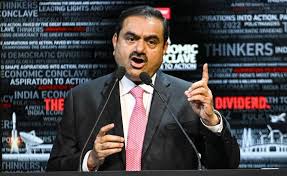 Washington, Feb 12: US President Donald Trump signed an executive order directing the Department of Justice to pause enforcing a nearly half-century-old law that was used to launch a bribery investigation against the Adani Group.
Washington, Feb 12: US President Donald Trump signed an executive order directing the Department of Justice to pause enforcing a nearly half-century-old law that was used to launch a bribery investigation against the Adani Group.Trump signed an order to pause enforcing of the 1977 Foreign Corrupt Practices Act (FCPA) that prohibits American companies and foreign firms from bribing officials of foreign governments to obtain or retain business.
The President directed US Attorney General Pam Bondi to pause enforcement of FCPA, which was at the heart of some of the US Department of Justice’s most high-profile cases, including an indictment against Indian billionaire and Adani Group head Gautam Adani and his nephew Sagar.
As many as six US Congressmen have written to the newly appointed Attorney General of the United States against “questionable” decisions made by the US Department of Justice (DoJ) such as the indictment against the Adani Group in an alleged bribery scam, which “jeopardises the relationship with close ally India”.
Lance Gooden, Pat Fallon, Mike Haridopolos, Brandon Gill, William R Timmmons and Brian Babin on February 10 wrote to Pamela Bondi, Attorney General of the US drawing “attention to some questionable decisions made by the DOJ under the Biden administration”.
The billionaire industrialist has been charged by US prosecutors for allegedly being part of a scheme to pay over USD 250 million (about Rs 2,100 crore) bribe to Indian officials in exchange of favourable terms for solar power contracts.
This was concealed from the US banks and investors from whom the Adani group raised billions of dollars for the project, the prosecutors have alleged.
US law allows pursuing foreign corruption allegations if they involve certain links to American investors or markets.
The Adani group, however, has denied the charges.
“Some of these decisions involved selectively pursuing and abandoning cases, often acting against America’s interests at home and abroad, jeopardizing relationships with close allies like India,” the Congressmen said in the joint letter.
India, they said, has been an important ally of the United States for decades. This relationship has flourished beyond politics, trade, and economics by evolving into a continuous socio-cultural exchange between the world’s two largest democracies.

